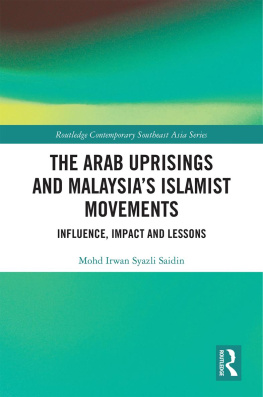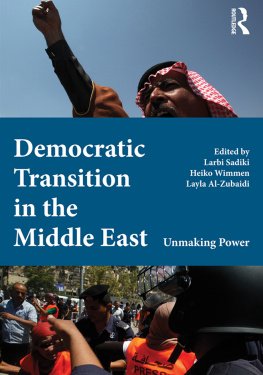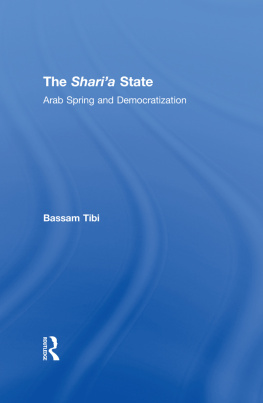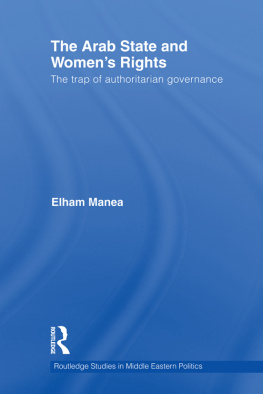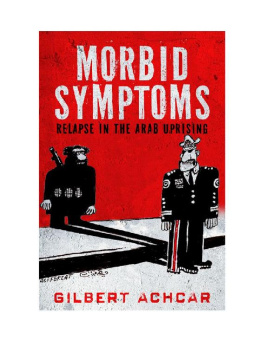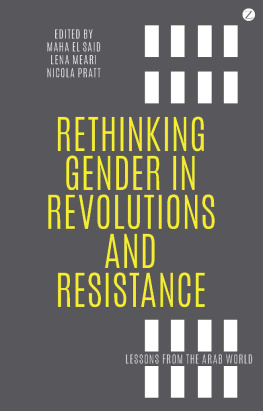FROM DEEP STATE TO ISLAMIC STATE
THE CERI SERIES IN COMPARATIVE POLITICS AND INTERNATIONAL STUDIES
Series editor, Christophe Jaffrelot
This series consists of translations of noteworthy manuscripts and publications in the social sciences emanating from the foremost French researchers at Sciences Po, Paris.
The focus of the series is the transformation of politics and society by transnational and domestic factorsglobalisation, migration and religion. States are more permeable to external influence than ever before and this phenomenon is accelerating processes of social and political change the world over. In seeking to understand and interpret these transformations, this series gives priority to social trends from below as much as to the interventions of state and non-state actors.
JEAN-PIERRE FILIU
From Deep State to Islamic State
The Arab Counter-Revolution and its Jihadi Legacy


Oxford University Press is a department of the University of Oxford. It furthers the Universitys objective of excellence in research, scholarship, and education by publishing worldwide.
Oxford New York
AucklandCape TownDar es SalaamHong KongKarachi
Kuala LumpurMadridMelbourneMexico CityNairobi
New DelhiShanghaiTaipeiToronto
With offices in
ArgentinaAustriaBrazilChileCzech RepublicFranceGreece
GuatemalaHungaryItalyJapanPolandPortugalSingapore
South KoreaSwitzerlandThailandTurkeyUkraineVietnam
Oxford is a registered trade mark of Oxford University Press in the UK and certain other countries.
Published in the United States of America by
Oxford University Press
198 Madison Avenue, New York, NY 10016
Copyright Jean-Pierre Filiu 2015
All rights reserved. No part of this publication may be reproduced, stored in a retrieval system, or transmitted, in any form or by any means, without the prior permission in writing of Oxford University Press, or as expressly permitted by law, by license, or under terms agreed with the appropriate reproduction rights organization. Inquiries concerning reproduction outside the scope of the above should be sent to the Rights Department, Oxford University Press, at the address above.
You must not circulate this work in any other form and you must impose this same condition on any acquirer.
Library of Congress Cataloging-in-Publication Data is available Filiu, Jean-Pierre.
From Deep State to Islamic State: The Arab Counter-Revolution and its Jihadi Legacy / Jean-Pierre Filiu.
ISBN 9780190264062
eISBN 9780190613297
The notion of inviting the army into the countrys political life again is extremely dangerous; it could turn Egypt into another Afghanistan or Somalia.
General Abdelfattah Sisi, Minister of Defence, 15 May 2013, less than two months before his coup against the elected president
If you are a patriot, you need to shut up and let us do our job, and clean up the mess you made with your revolution.
Threats from the Egyptian security services reported in January 2014 by former MP Mostafa Al-Nagar
Mostafa al-Nagar, born in 1980, is one of the few activists of the Egyptian 25 January 2011 revolution to have successfully joined the political scene. After an early involvement in the Muslim Brotherhoods youth wingwhich he left in 2005he became a vocal defender of human rights and Palestinian causes. (A dentist by profession, he volunteered in Gaza to help the victims of the Israeli offensive of January 2009.) He was jailed four times under Mubaraks regime. In June 2011 he became one of the co-founders of the Adl (Justice) party, and then its only member in the parliament that was elected in NovemberDecember 2011, but dissolved by the Supreme Constitutional Court in June 2012.
CONTENTS
It has been four years now since Mohammad Bouazizis self-immolation in the Tunisian town of Sidi Bouzid sparked a wave of popular protests against the Arab regimes. President Ben Ali was the first to fall in January 2011, followed by Husni Mubarak the following month. At that time, I was visiting professor at Columbia University, far from my home country and from the Arab world, but close enough to feel the shockwaves of this extraordinary development and to participate in its aftermath.
My background as a historian soon led me to believe that this was only the beginning of a long-term process, itself rooted in the two-century long and complex period known as the Arab renaissance, or Nahda. I was therefore reluctant to use the expression Arab spring, anticipating that an Islamist autumn would eventually replace it in the mainstream lexicon. I favoured instead the Arab revolution, not because I thought that revolutions would take place in every Arab country, but because I was convinced that a pan-Arab dynamic was nurturing a regional wave of radical protest.
As early as spring 2011, I authored The Arab Revolution, Ten Lessons About the Democratic Uprising, published the following summer by Hurst in London and Oxford University Press in New York. Far from being academic landmarks, these lessons were meant to be modest signposts to keep track of a multi-faceted process that would only become more difficult to interpret and to categorize.
This kind of leap in the dark was not the spontaneous attitude a seasoned historian should adopt. Yet I was hoping that Arab historians would benefit from the democratic breakthrough and take a fresh look at their own national narratives. I believed that history was just one of the many scholarly resources that could help us grasp the long-term impact of an event of such profound global importance.
Nearly four years later, I readily confess that my focus on the Arab revolution prevented me from assessing the full potential of the Arab counter-revolution. I thought I had seen it all from the Arab despots: their perversity, their brutality, their voracity. But I was still underestimating their ferocity and their readiness to literally burn down their country in order to cling to the absolute power. Bashar al-Assad has climbed to the top of this murderous class of Arab tyrants, driving nearly half the Syrian population from their homes.
This is how this Arab counter-revolution was conceived: not as a paradoxical sequel, but as a study of the repressive dynamics designed to crush any hope of democratic change, through the association of any revolutionary experience with the worst collective nightmare. In order to describe this systematic war of the Arab regimes against their people, I had to import and scrutinize the concept of the Deep State from neighbouring Turkey. That was a means of explaining how the nucleus of the ruling cliques could strike back with such unbridled violence.
This attempted conceptualization would however have been pretty weak without the parallel use of the Mamluk paradigm to underline how modern security systems were established and empowered. Contrary to previous works about the New Mamluks, dealing with the Ottomanized Mamluks of the seventeenth and eighteenth centuries, I am referring to the original Mamluks who ruled Egypt from 1250 to 1517, along with Syria from 1260 to 1516. I draw a parallel between the legitimacy derived by those founding Mamluks from the vulnerable caliph under their control and the one derived by the modern Mamluks from the popular votes held under martial law.
addresses the process of state-building in the post-colonial Arab world. My hypothesis is that the Arab renaissance, or Nahda, was consistently contested by two ideologies that laid the foundations for two modern states: Kemalism for Turkey and Wahhabism for Saudi Arabia. In the meantime, it took half a century, from 1922 to 1971, for the colonized Arabs to reach sovereign emancipation. But through this very process, two decades were sufficient, from 1949 to 1969, for military cliques parading as a fighting elite (




